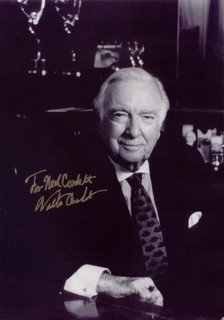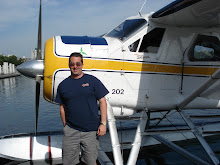Walter Cronkite 1916-2009

Born in St. Joseph, Missouri, in November 1916, long-time CBS-TV News anchorman Walter Leland Cronkite, Jr., was raised in Houston, Texas. He went to Houston's San Jacinto High School. In 1933, he became a student at the University of Texas.
In Austin, Cronkite worked at both his college newspaper, The Daily Texan, and the State Capitol forming a lifelong tie to the city. He got paid for part-time work as a copy boy and sometimes reporter for various newspapers at their Capitol bureaus. "It was a very happy time in my life," Cronkite said during a 1999 reunion for The Daily Texan's centennial celebration. "I had too good a time," he added, saying that he visits Austin "as often as I can but not often enough." His daughter Kathy and her family live there.
At UT, Cronkite joined the Chi Phi fraternity and ran for freshman class president. He lost to high school buddy Joe Greenhill, who was later chief justice of the Texas Supreme Court. Cronkite's newspaper work, along with a magazine article he read about a foreign correspondent, motivated him to quit UT in 1935 and take a full-time news job at the Houston Post.
Another professional influence on Cronkite was long-time Texas newspaperman Gordon Kent Shearer, perhaps best known for his service as bureau chief for the United Press in Austin. He opened that office in 1927 and worked there for twenty years. Shearer's column, "Under the Dome," was a popular political feature. Cronkite worked under Shearer and credited much of his early journalistic training to him.
Cronkite got his training in broadcast journalism at Midwestern radio stations, and during World War II he covered the European theater for United Press. After the war, he served as chief United Press correspondent at the Nuremberg trials.
Cronkite joined CBS News in 1950, worked on a variety of programs, and covered national political conventions and elections from 1952 to 1981. He was one of the original creators of the CBS Evening News in 1962. He anchored that broadcast until his 1981 retirement. The public's perception of him as honest, objective and level-headed led to his popular title as "the most trusted man in America." His nightly sign-off, "and that's the way it is," was his trademark. His voice enthusiastically narrated the U.S. manned space program and was one of relative reason during the Vietnam War and the Watergate scandal.


<< Home